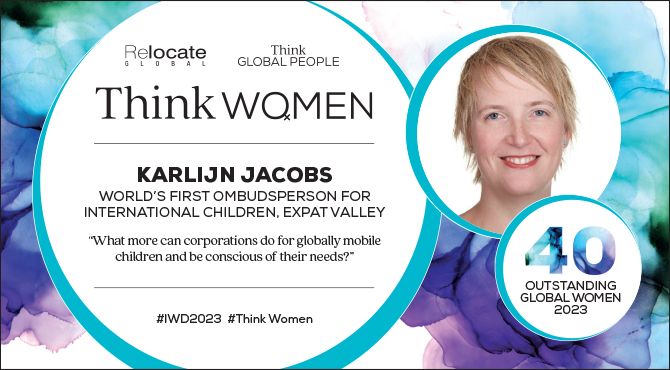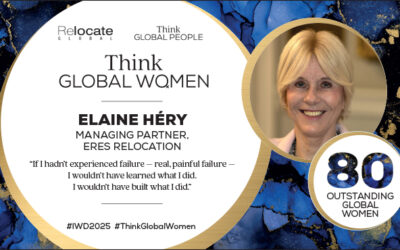Think Women
Karlijn Jacobs | 40 Outstanding Global Women 2023

Improving children’s experiences in international moves
When Professor Rob Kelly’s toddler gate crashed a live CNN interview back in 2017, few could have known then that many of us with families would go on to experience similar as the business world moved into our homes because of the lockdowns.
Both these seminal moments remind us that the boundaries between home and work are increasingly blending. The explosion in hybrid working practices and the focus on employee and family wellbeing in both local and international contexts highlight the innovation, evolution and continual renegotiation of the employee/employer relationship, especially in the inclusion and talent management arenas.
In Global Mobility, these conversations around employee experience remain as necessary and as timely as ever. Family considerations and difficulties settling remain key – and costly – reasons for assignment refusal or failure. The increasing automation and self-service approach of international moves, more dual-career families on assignment, and mental and physical wellbeing considerations are opening spaces for more individually focused assignment management.
It’s on this leading edge that Netherlands-based Karlijn Jacobs has been renewing and driving the conversation around family wellbeing in multinational organisations. A change maker and advocate of children’s experiences in cross-border moves, Karlijn, who qualified as a children’s therapist, is the world’s first ombudsperson for international children.
“What more can corporations do for globally mobile children and be conscious of their needs?”
Karlijn Jacobs, World’s First Ombudsperson for International Children, Expat Valley
Establishing an ecosystem for international children
With her colleagues at Expat Valley, Karlijn is supporting families and children by sharing with employers awareness of the challenges families face on assignment and advocating for better support.
As the international ombudsperson for international children, Karlijn is playing an important role in normalising the rollercoaster of emotions an international move brings for family members. Through outreach to employers, relocation management companies (RMCs), destination service providers (DSPs), HR and policy advisers, and relocating families, her support is improving employee experience and retention, as well as the quality of family life on assignment and beyond.
“There are so many children moving around the globe on a daily basis in different capacities,” says Karlijn. “In the context of global mobility and corporate-sponsored international moves, there’s a lot of work to be done. Often global mobility is so focused on the tax and immigration side, that there’s thinking if schooling is covered off, that’s enough. We are advocating specifically for children, building on top of those very important things.
“There are definitely organisations out there that do more for international children,” continues Karlijn. “There are also lots of individuals working in this capacity as coaches to families and TCK [third-culture kids] experts. Expat Valley is about establishing that ecosystem around children and allowing multinational corporations to directly support them without getting directly involved in parenting.”
Karlijn firmly believes there is “a massive opportunity for multinationals to let parents know what they are signing up for with an international assignment”. These include the social-emotional impacts, what happens when friends and favourite teachers move on, multilingualism and connection to formative cultures, the choices and implications of international or localised education, as well as the complexities around identifying SEN or development needs on assignment.
“Fortunately, in recent years, we’ve seen increased attention on trailing spouses and partners, which is great,” says Karlijn. “Safe Passage Across Networks [SAPN], for example, is also doing an amazing job when it comes to international schools and raising awareness of the transience of international schools’ entire community.”
But across the Global Mobility supply chain, for reasons including time and budget constraints and a focus on the compliance angle, there’s still little attention paid on the corporate side to children moving. This means there is a significant lack of understanding of the impact of those transitions on children’s mental health and sense of identity, says Karlijn.
“At Expat Valley we are asking what corporate employers can do to be more inclusive and attentive to children who are going on an international relocation. What could household goods removal companies or destination service providers do to be more responsive to the needs of those children, for example? We are currently involved in a project with Harmony Relocation Network on an overarching strategy. They recognise in the industry and in their realm of responsibility there are very few organisations that identify themselves as child-friendly because that’s just not where we are yet. But they are now beginning to consciously think of children within the scope of their services.”
Accommodating family needs in policy and practice
Karlijn is passionate about addressing children’s needs, feelings and aspirations around international moves. This includes explaining the ‘why’ of the move through customised books about their parent’s employer and storytelling around other children’s experiences.*
Raised by parents who were teachers and in a family environment where inclusion and people feeling represented “was something that’s just a natural driving force,” Karlijn’s trajectory is informed by compassion and an awareness of “what it means for people who are fighting to find their role in society.” From these foundations, Karlijn trained and worked as a children’s therapist. Accompanying her husband on assignment to Shanghai, she continued to work in a therapeutic role alongside international hospitals and schools in the expat community and then worked in international education consulting.
These almost six years in Shanghai coincided with the couple starting their own family and a tipping-point experience that led her to conclude that employers can do more to support families on assignment. “In Shanghai, we were identifying our own needs and trying to find solutions independently,” says Karlijn. “For some things, that worked really well. For others, it created a lot of unnecessary risk or time investments.” A pivotal moment was when Karlijn was pregnant and the washing machine caught fire. The family was trying to establish who was responsible for replacement and repairing the damage between local landlords and local HR in Shanghai.
“We went back and forth until the point that we realised it’s not about responsibility for this ancient washing machine. It’s that we are living here for work and nobody seems to understand our problem. The same with the baby. What if we go through a similar experience with something else and then what happens? Nobody knows how to support us. If we can’t figure out how to do this then I am not having my baby here,” says Karlijn of her thought processes at the time.
“My husband’s boss at the time was also an expat. He immediately understood and the issue was resolved. But that’s what we were looking for as parents. This very personalised experience touches on what families are going through daily. A misunderstanding of what it means to raise your family in a foreign country without your reliable support network. It’s also about understanding what is happening in your environment because of the cultural differences and systems not being designed for international children.”
Raising awareness, action and change
Karlijn has seen keen interest from employers for her work in this area. “I can still count on the fingers of one hand the employers who weren’t interested,” she says. “Most employers say they have never thought about this. It’s not a matter of not wanting to support children and families; it’s just a matter of no vendor, policy adviser or benchmarking effort historically has drawn the attention of the organisation towards looking at what they are actually doing for the children. That is where our journey with our partners starts.
“As much as possible, it’s about raising awareness for the children of international moves. There is research out there that highlights the importance of caring for these children. Family reasons are a major reason for assignment refusal and assignment failures. However, those findings have had little impact on the mobility industry, so that is what we are advocating for.
“We run inspiration sessions, inviting GM professionals and their HR professionals to learn about the topic and children’s experiences in international relocation. We really add the human element back into the journey, which I think some organisations have lost touch with a little bit over time. We support organisations with reviewing their existing policies and aligning those with HR ambitions and even above that, their ESG ambitions.”
Together with her colleagues at Expat Valley, Karlijn has also created a First Aid Kid for children making international moves to help them deal with the emotional aspects of transition, as well as online resources. “The First Aid Kid contains materials to educate and support children with international moves, for example, hosting goodbye parties to create memories to learn about other children’s experiences. The materials are designed to meet children where they are on their journey and to help them to communicate with parents around any feelings they have towards international relocation.”
Karlijn’s work is landing well with responsible organisations looking to invest in the social impact of their organisations and go beyond the very minimum of policies, including around avoiding child labour in their supply chain. “If you look at the United Nation’s Convention on the Rights of the Child, Article 12 stipulates they are supposed to have a say in any decisions made that really impact their lives. I would argue that international relocation significantly impacts a child’s life. But nowhere in those conversations are organisations supporting children. We are addressing the topic from different angles with employers. Change is a formula. If you raise awareness and act, then that leads to results and change. We have a great opportunity now to show we can change the systems that are supporting our children,” says Karlijn.
*Another resource is the ‘Children’s Assignment Letter’ template for global mobility teams. Request a link here.











